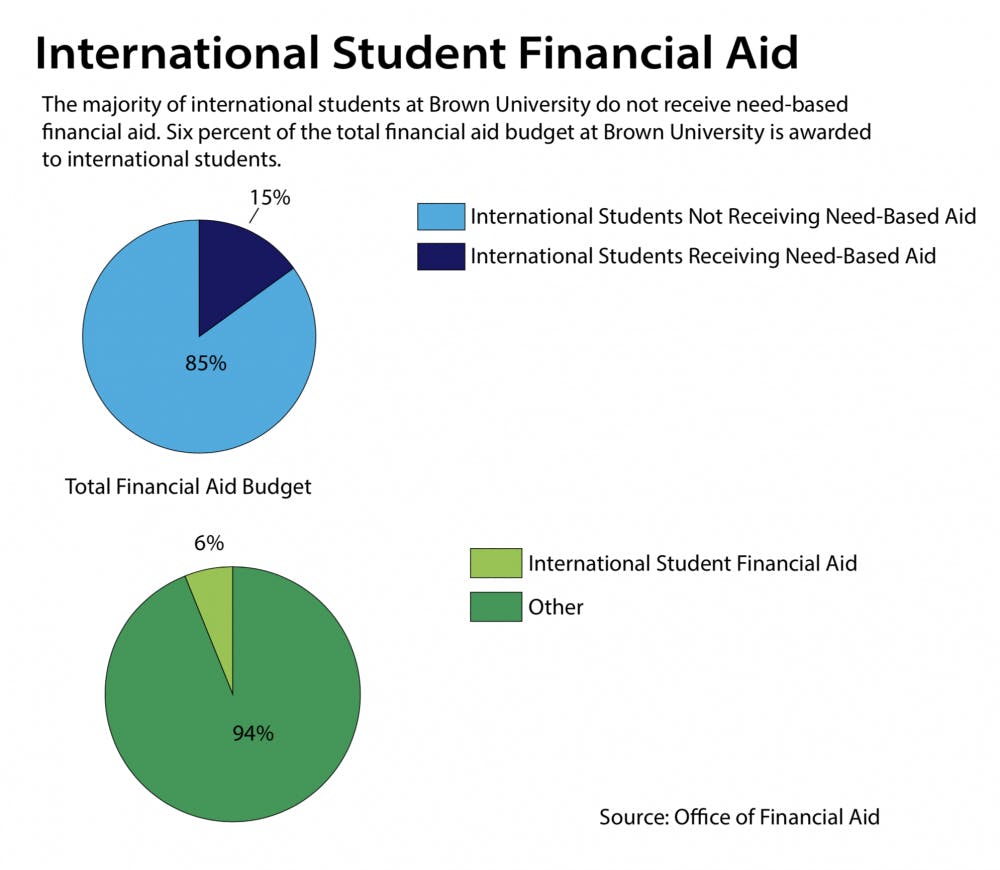This is the second of two stories in a series titled, “Far from Home: Navigating Brown,” which explores the experiences of international students at the University.
Amid national attention to the fairness of the college admission process, calls have also increased to make the University more accessible for everyone — including all international students.
Currently, the University uses a need-aware admission system for international students, meaning that the University “will take into account the (students’) financial need in making admission decisions,” according to the Office of Financial Aid’s website. But some students have said this system dissuades many international candidates from applying for financial aid and discourages others from applying to Brown altogether.
At Brown, some international students chose not to apply for financial assistance because they felt afraid that the need-aware admission policy would hurt their chances of being accepted to the University, said Beatriz Silveira De Arruda ’19, an international student from Brazil.
For Eleni Gkini ’21, though Brown was her dream school, the need-aware admission policy almost deterred her from applying. “I always wanted to come to Brown, but my counselor told me to apply to another school because Brown does not have need-blind admissions,” she said.
According to Dean of Admission Logan Powell, the University does not consider financial need in the initial stages of the admission process. “The first principle of our admission process is that we always admit the strongest applicants regardless of need,” he said. “It’s only at the very end of the process, after we have selected the groups of (potential) students … that we have a better sense of what their financial need is.”
Powell explained that the University first selects international applicants based on other factors including intellectual promise and their fit with Brown. After this pool has been selected, the Office of Financial Aid determines how much financial aid the tentatively admitted international student group needs. “If we are in our (budget), then wonderful. If we are not in our range, we might have to make some need-aware decisions,” he added.
Fifteen percent of the University’s international student population is currently receiving need-based scholarship, making up 6 percent of the University’s total financial aid budget, the Herald previously reported.
“Thankfully, I had the opportunity to attend Brown on full financial aid, but I am very much aware that I am one of the few who had the chance,” said Iman Musa ’21, a student from Brazil.
Going forward, students have expressed hope that the University will consider implementing a need-blind admission policy for international students. “Brown tries to bring the brightest young minds to this place, and it’s quite impossible to do that if you don’t acknowledge that the brightest minds may be from low-income backgrounds,” Musa said.
By adapting to new places and connecting with different communities, international students have proven “able to push boundaries and … could give so much to the Brown community and benefit current, past and future students,” said José Soria ’19.
Need-blind admission for international students is a high priority for the University, Powell said. But administrators are still in the initial conversation stage of building a new system.
There has been a lot of conversation, planning, researching and thinking about what need-blind admission would mean and what resources would be needed, he added. “It requires a joint effort between the President, the Provost, the Office of Admission (and) the Office of Financial Aid,” he said.
To raise enough money to fund a need-blind admission system, the University should consider adjusting its fundraising model, Soria said. Soria previously wrote in an op-ed in The Herald that the University should commit to a public timeline for reforming international student admissions, citing need-blind policies at peer schools like Harvard, Yale and Princeton.
Although having need-blind admission may not be possible at the moment, increasing the amount of financial aid allocated to international students so that more low income students can attend would be a step in the right direction, Silveira De Arruda said.





